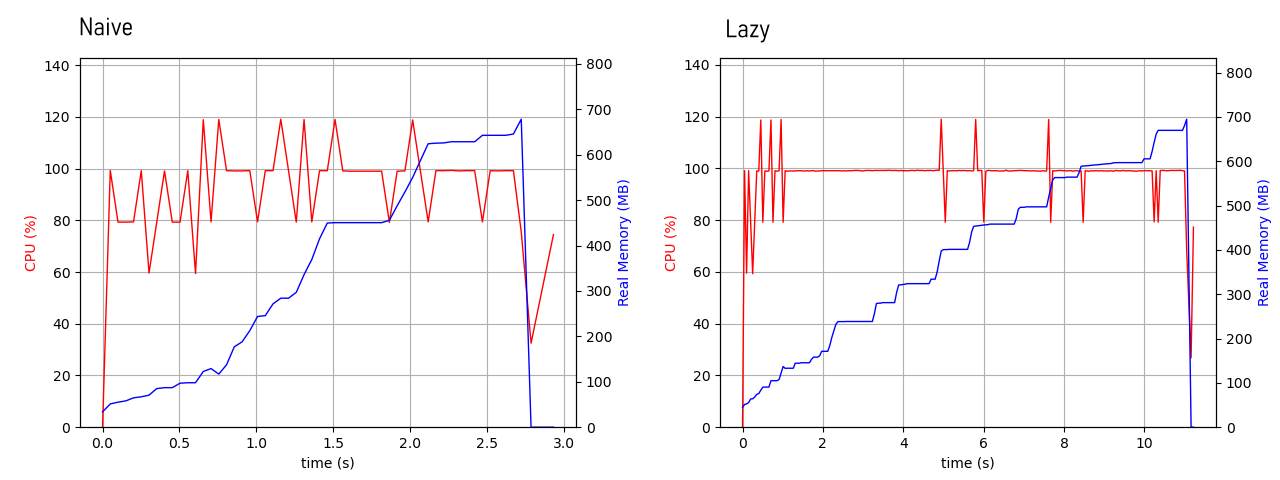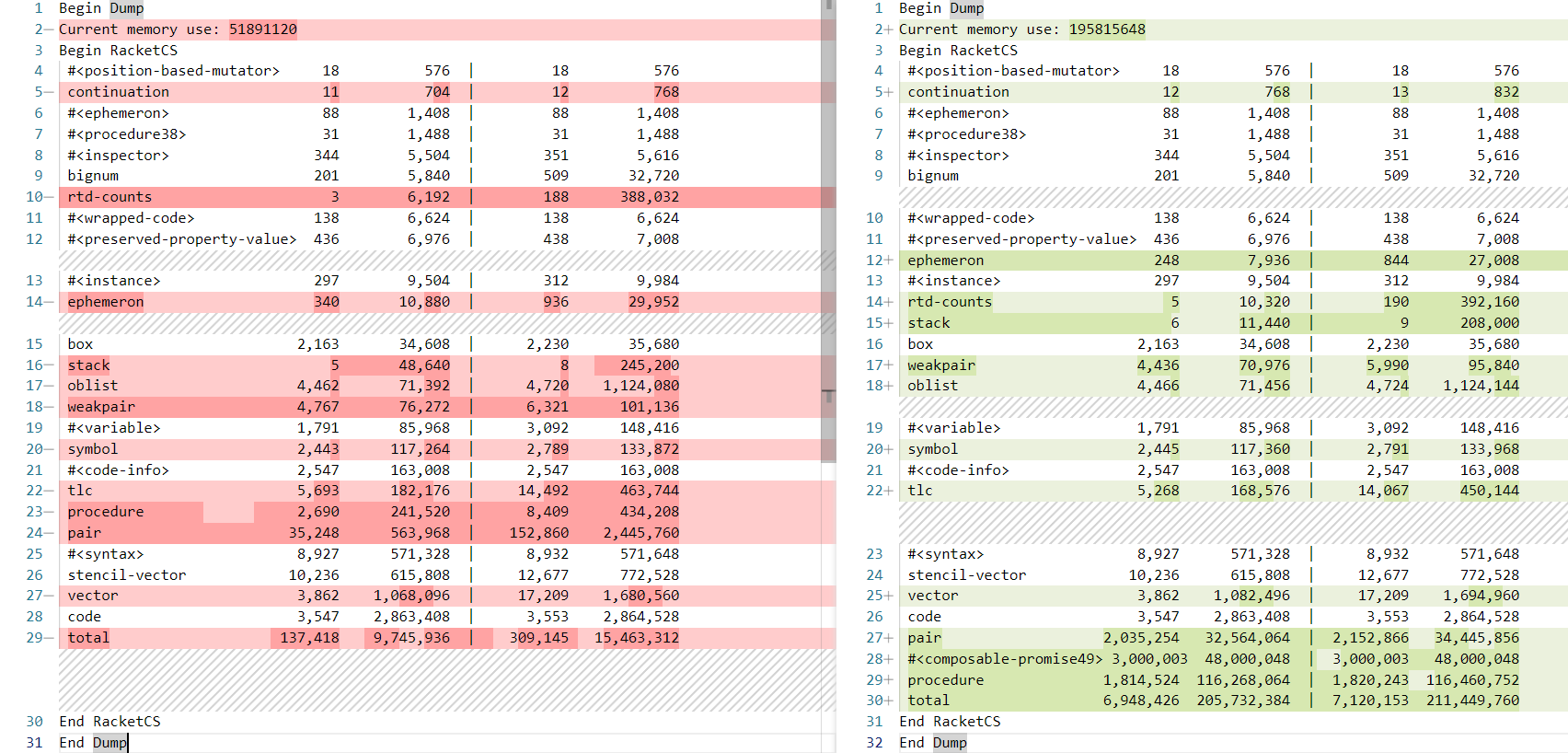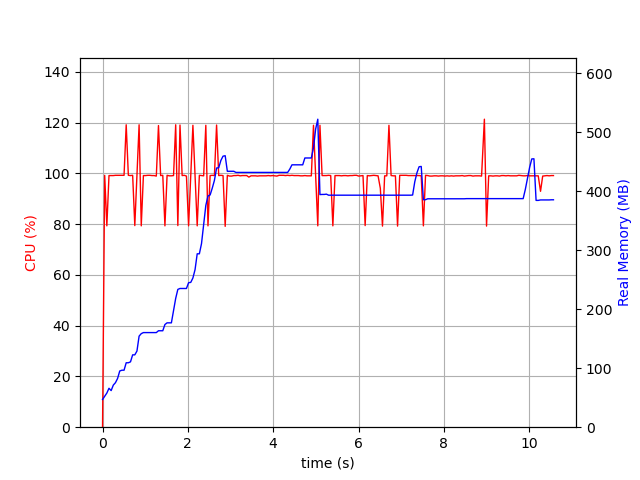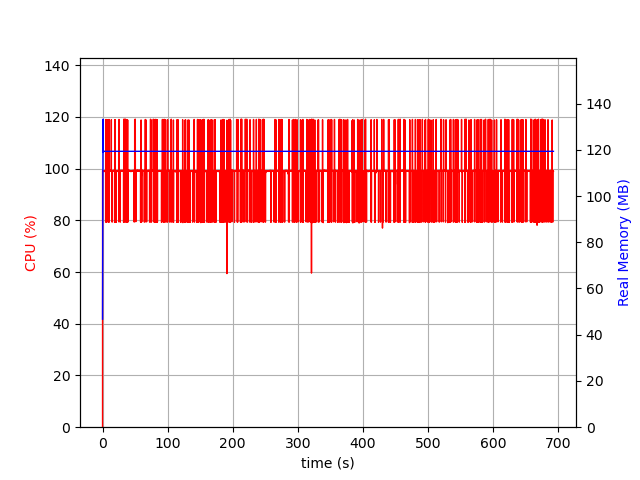Imagine you want to count the sum of the numbers from 1 to 1,000,000,000 (one billion). If you come from an imperative programming background, you might be already thinking on a loop and what number type to hold that value. You might come up with something similar to this if you’re writing C:
uint64_t sum = 0;
for (int i = 1; i <= 1000000000; i++)
sum += i;
printf("%lu\n", sum);
Good, it runs quite fast and we get the solution. But let’s try to write a solution for that problem in a functional-style Python:
sum(range(1,1000000001))
It’s more elegant and simpler. I like it. But I’m not satisfied and I want to do it in Racket:
(apply + (range 1000000001))
Since Racket doesn’t have a sum function, I use apply and pass the function + to it. But when I try to run in DrRacket, I get this error:

Memory Error in DrRacket executing the naive approach
It makes sense, because the apply function basically gets every element in the list and apply as parameters to pass to the function specified. Example:
(apply + (range 10))
Will expand to:
(+ 0 1 2 3 4 5 6 7 8 9)
And considering that Racket uses big numbers as the default numeric type, I can imagine that it’ll take a lot of memory to expand a million values. But that’s unecessary, let’s try a different way, let’s fold that list:
(foldl + 0 (range 1000000001))
foldlstands forFold Left, it will reduce the list using the procedure passed in the first parameter with the accumulator in the second parameter. In that example, it will call the+procedure with 0 and the first element in the list, then update the accumulator for the next element in the list and so on.
Oh no. Same memory problem. But expected again, after all, we’re still using the range function, that creates a list with the numbers within that range. Which means that it’s not the foldl that is breaking our program, but the range itself. But what if we could make it lazy? I mean, only compute that range as we consume it?
Time splits here, in one timeline I went straight to the Solution, in the other one I decided to explore other options:
Luckily, Racket has a lazy version of it, all we need to do is set #lang lazy at the beginning of the code file:
; Regular Racket version
#lang racket
> (range 11)
'(0 1 2 3 4 5 6 7 8 9 10)
; Lazy version
#lang lazy
> (range 11)
'(0 . #<promise:...7/pkgs/lazy/base.rkt:299:29>)
Okay, that looks promising! ;)
Lazy Racket already provides all the basic list functions adapted to use those promises, so we can use our foldl, right?
(foldl + 0 (range 1000000001))
. . .
Argh! Memory error again. Let’s try to figure out why.
Tracking Memory Usage
We know that it is consuming too much memory to the point where the Racket interpreter is killing it. I’m gonna use psrecord to track the memory of our process and plot it to a graph. It’s pretty simple to run it in a debian-based system.
Setting up psrecord
$ pip3 install psrecord
$ sudo apt-get install python3-matplotlib python3-tk
Then I created a shell script plotprocess.sh to help tracking it:
#!/bin/bash
$*
&P1=$!
graphfile="$(date +%s).png"
psrecord $P1 --interval 0.05 --plot $graphfile
P2=$!
wait $P1 $P2
echo "Graph plot in '$graphfile'"
Now we only need to call $ ./plotprocess.sh process to start the process and plot the memory/cpu of it.
Tracking with ./plotprocess.sh
I created two files with both regular and lazy racket code for the foldl:
; foldl-naive.rkt
#lang racket
(foldl + 0 (range 1000000001))
; foldl-lazy.rkt
#lang lazy
(foldl + 0 (range 1000000001))
So now I can track the memory usage of both of them:
$ ./plotprocess.sh racket foldl-naive.rkt
Attaching to process 10866
./plotprocess.sh: line 6: 10866 Killed $*
Graph plot in '1680099684.png'
$ ./plotprocess.sh racket foldl-lazy.rkt
Attaching to process 10914
./plotprocess.sh: line 6: 10914 Killed $*
Graph plot in '1680100084.png'

Memory and CPU from the execution of the naive and lazy foldl programs
The memory usage of the process is clearly rising up to 700mb. Then it’s killed. But there’s an important thing to note here: the execution time. The naive version gets killed after around 3 seconds, whereas the lazy one goes over 10 seconds. That tells me that the lazy version is actually iterating over the list for some time, but bloating the stack or the heap with garbage.
In fact, I decided to test it with the trace library that Racket provides. The problem is it only traces custom procedures. So I had to reimplement foldl:
(require racket/trace)
(define (lfoldl f v l)
(if (empty? l)
v
(lfoldl f (f (car l) v) (cdr l))))
(trace lfoldl)
Now running it for both regular racket and lazy racket gets me me this:
> #lang racket
> (lfoldl + 0 (range 1000000001))
Interactions disabled; out of memory
> #lang lazy
> (lfoldl + 0 (range 1000000001))
>(lfoldl #<procedure:+> 0 '(0 . #<promise:...7/pkgs/lazy/base.rkt:299:29>))
<#<promise:...e/pkgs/lazy/base.rkt:364:27>
>(lfoldl #<procedure:+> 0 '(1 . #<promise:...7/pkgs/lazy/base.rkt:299:29>))
<#<promise:...e/pkgs/lazy/base.rkt:364:27>
>(lfoldl #<procedure:+> 1 '(2 . #<promise:...7/pkgs/lazy/base.rkt:299:29>))
. . .
Until a point where it gets killed due to memory usage.
Trying to track with Racket’s (dump-memory-stats)
Racket has a timid set of memory diagnostics functions available. The (dump-memory-stats) function will print to the error output the memory usage at the moment.
I tried retrieveing the information at the beginning of the program execution and at the last iteration of the lfoldl function:
#lang lazy
(dump-memory-stats)
(define (lfoldl f v l)
(if (empty? l)
(let ()
(dump-memory-stats)
v)
(lfoldl f (f (car l) v) (cdr l))))
(lfoldl + 0 (range 1000000)) ; high enough number, but runs to the end
The full output with the two dumps is here. It’s a bit confusing at first, but after removing the useless information (all the data that didn’t change from one to the other) and comparing the two dumps, we have this:

Memory dump beginning of program execution and last iteration
I don’t know exactly the difference between the two sets of columns, but I imagine the columns in them are object count and size. I’m also assuming all the sizes are in bytes.
The Current memory use values don’t really line up with the values in the total line. The first execution shows the memory usage to be around 51mb and the total being 15mb. And the second 195mb vs 211mb. Also those numbers are a bit off from what psrecord tracked:

psrecord tracking of the process
But that all won’t keep me from looking at what changed between the two dumps. And the most important lines are:
pair 2,035,254 32,564,064 | 2,152,866 34,445,856
#<composable-promise49> 3,000,003 48,000,048 | 3,000,003 48,000,048
procedure 1,814,524 116,268,064 | 1,820,243 116,460,752
All of these objects had an incredible growth in objects and size and are the ones that consume the most amount of memory. #<composable-promise49> wasn’t event present in the first dump. My assumption is that all those promises are stuck somewhere in the stack, considering that the lazy language is making all sorts of operations a promise, the conditional and the call to the f function within lfolfl are probably becoming promises too. Leaving the Lazy Racket aside…
The Solution
The solution for this problem is the use of Streams:
(stream-fold + 0 (in-inclusive-range 0 1000000000))
It does take quite some time to run, but it works. The principle is the same, the function in-inclusive-range will generate a Sequence, that is lazy by default.
The execution graph is not very impressive, the memory use is stable:

Execution graph for the stream solution
I also wrote a custom version of the stream-fold function that dumps the memory at the last iteration so I can have more insights on that difference from the Lazy Racket one, but there’s not a significant change. So I’ll stop here.
Conclusion
I was motivated by this repository with implementations in several languages on this problem. I actually had the implementation with Streams quite early, but I wanted to explore a bit more other lazy structures in Racket, and more specifically the Lazy Racket. In the end, seems like it’s not as simple to use as I imagined.
While I didn’t really learn a lot about the internals of the lazy implementation of Racket, I enjoyed this whole process. If you happen to know more about this, I’d love to hear from you.